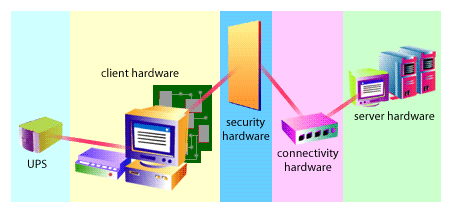Firewall as Part of the Network

- client hardware: Desktop computer, network interface card, and modem
- server hardware: A remote device shared by many users. It may store a particular resource, such as Web pages, or perform specific functions, such as forwarding and receiving email.
- connectivity hardware: Allows a device or a program to link to other devices or programs.
- security hardware: Firewall: ensures that data stored in a computer cannot be accessed by unauthorized users.
- UPS: The uninterrupted power supply ensures that electrical power continues to be available during a power outage.
What are Firewalls?
Firewalls are tools that can be used to enhance the security of computers connected to a network, such as a LAN or the Internet.
A firewall separates a computer from the Internet, inspecting packets of data as they arrive at either side of the firewall ?
- inbound to,
- or outbound from,
- your computer
- by either denying or accepting all messages based on a list of designated acceptable or unacceptable sources, or
- by allowing or denying all messages based on a list of designated destination ports.
TCP/IP
In order to understand how firewalls work it is important to understand the basics of TCP/IP, the language or protocol which all computers on the internet use to communicate. If you are not at all familiar with concepts such as packets, ports and IP addresses, please refer to the following page on
Transport Layer
TCP/DUP.
If you are, the following section may seem elementary. However, it explains each of the aspects of TCP/IP as it relates specifically to firewalls.
Let us start by saying that TCP/IP is a language that allows different computers to communicate.
On the Internet, this language is spoken and understood by all different types of computers, even those using different
operating systems such as Windows, Macintosh, or Unix.